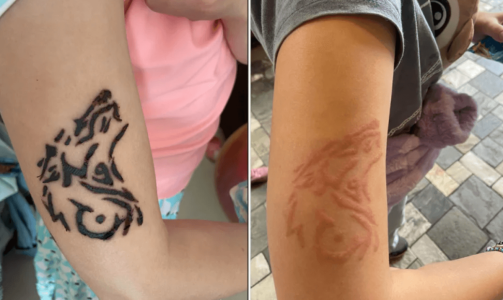Nine-year-old left with scarring after henna tattoo mishap overseas
- Replies 5
Bali is a paradise for Australian holiday makers these days, but unfortunately, it can also be a dangerous place for those seeking a little bit of fun.
One Melbourne mum, Kaitlyn Salter, recently spoke out about her family's traumatic experience on the popular Indonesian island, which left her nine-year-old daughter, Imogen, scarred for life.
The Salter family's ordeal began during a beach outing when Imogen was enticed by several vendors to pick out a temporary henna tattoo.
While some natural henna tattoos are safe, the one Imogen received used black dye, which caused an allergic reaction that lasted long after the family returned to their hotel.

Just two days after the tattoo was applied, Kaitlyn noticed that Imogen's arm was starting to blister and, by the next day, was oozing with infection.
'I started her on antibiotics and antihistamines and kept up the antiseptic cream as well as bought some Betadine. It's been aching and itchy for her ever since,' said Ms Salter.
The family were able to get some topical treatment in Bali, but due to the severity of the infection, stronger antibiotics were needed when they arrived back in Australia.
'The first doctor in Bali thought it would clear up, and initially, I thought it was looking better for a couple of days, but once we arrived back in Melbourne, it's just gotten worse,' she recalled.
The infection has since healed, but Imogen was left with a painful and raised scar. Kaitlyn is now urging other tourists heading to Bali to be fully aware of the potential dangers of temporary henna tattoos.
In a warning shared with Yahoo News Australia, she said: 'I had no idea, and now my daughter's scarred! This is after having to go on antibiotics and Vitamin E cream, as well as antiseptic cream, when it was blistered.'
'Think twice. Wish I had known this could have happened.'
Kaitlyn's message was echoed by hundreds of comments from other travellers in a Bali Facebook group, who shared their experiences of being burned by 'black henna'.
'My daughter got two hennas. First was quite red-like, and second was black and got what I call chemical burn,' someone shared in the comments section.
Another agreed and added, 'The black is the bad stuff, as is blue or grey. There is no natural black henna, no matter how much they say it's natural.'
As Kaitlyn's story shows, asking the right questions before getting temporary tattoos is crucial.
In particular, it's important that you ensure the product being used is natural henna, which tends to produce safe, chocolate-brown or mahogany tattoos.
Buying black henna, typically sold for a fraction of the cost of the natural stuff, comes with huge risks, as it's typically adulterated with paraphenylenediamine (PPD), which is a known allergen.
If you're not sure about the ingredients in the henna—or if you already have sensitive skin—it's best to steer clear.

When travelling abroad, especially to places with less regulation than Australia, it's essential to be extra cautious. The government travel advice websites recommend taking precautions before getting a henna tattoo overseas.
One vital step is to do a patch test to check for any adverse reactions, as some henna products might be mixed with harmful substances like PPD.
In the meantime, let's send our best wishes to Kaitlyn and Imogen as they try to understand what caused Imogen's scary allergic reaction and work towards restoring her back to full health.
Now, we're curious to hear from all of you. Have any of you ever had a henna tattoo overseas? If so, please share your experiences with us in the comments below! Your stories and insights can help others stay safe while enjoying their travels.
One Melbourne mum, Kaitlyn Salter, recently spoke out about her family's traumatic experience on the popular Indonesian island, which left her nine-year-old daughter, Imogen, scarred for life.
The Salter family's ordeal began during a beach outing when Imogen was enticed by several vendors to pick out a temporary henna tattoo.
While some natural henna tattoos are safe, the one Imogen received used black dye, which caused an allergic reaction that lasted long after the family returned to their hotel.

Salter's nine-year-old daughter, Imogen, got a black henna tattoo in Bali, unaware of the dangerous chemical that could cause scarring. Credit: Facebook.
Just two days after the tattoo was applied, Kaitlyn noticed that Imogen's arm was starting to blister and, by the next day, was oozing with infection.
'I started her on antibiotics and antihistamines and kept up the antiseptic cream as well as bought some Betadine. It's been aching and itchy for her ever since,' said Ms Salter.
The family were able to get some topical treatment in Bali, but due to the severity of the infection, stronger antibiotics were needed when they arrived back in Australia.
'The first doctor in Bali thought it would clear up, and initially, I thought it was looking better for a couple of days, but once we arrived back in Melbourne, it's just gotten worse,' she recalled.
The infection has since healed, but Imogen was left with a painful and raised scar. Kaitlyn is now urging other tourists heading to Bali to be fully aware of the potential dangers of temporary henna tattoos.
In a warning shared with Yahoo News Australia, she said: 'I had no idea, and now my daughter's scarred! This is after having to go on antibiotics and Vitamin E cream, as well as antiseptic cream, when it was blistered.'
'Think twice. Wish I had known this could have happened.'
Kaitlyn's message was echoed by hundreds of comments from other travellers in a Bali Facebook group, who shared their experiences of being burned by 'black henna'.
'My daughter got two hennas. First was quite red-like, and second was black and got what I call chemical burn,' someone shared in the comments section.
Another agreed and added, 'The black is the bad stuff, as is blue or grey. There is no natural black henna, no matter how much they say it's natural.'
As Kaitlyn's story shows, asking the right questions before getting temporary tattoos is crucial.
In particular, it's important that you ensure the product being used is natural henna, which tends to produce safe, chocolate-brown or mahogany tattoos.
Buying black henna, typically sold for a fraction of the cost of the natural stuff, comes with huge risks, as it's typically adulterated with paraphenylenediamine (PPD), which is a known allergen.
If you're not sure about the ingredients in the henna—or if you already have sensitive skin—it's best to steer clear.
Key Takeaways
- An Australian mother has warned fellow travellers to Bali about the potential dangers of temporary henna tattoos after her daughter had a severe allergic reaction.
- The nine-year-old girl was left with a scar following her reaction to the black henna dye.
- The post on a Facebook group for Bali tourists advised others to think twice before getting a henna tattoo, as reactions can be severe and cause lasting damage.
- Unlike natural henna, black henna often contains paraphenylenediamine (PPD), which can cause severe allergic reactions in as many as one in five people.
When travelling abroad, especially to places with less regulation than Australia, it's essential to be extra cautious. The government travel advice websites recommend taking precautions before getting a henna tattoo overseas.
One vital step is to do a patch test to check for any adverse reactions, as some henna products might be mixed with harmful substances like PPD.
In the meantime, let's send our best wishes to Kaitlyn and Imogen as they try to understand what caused Imogen's scary allergic reaction and work towards restoring her back to full health.
Now, we're curious to hear from all of you. Have any of you ever had a henna tattoo overseas? If so, please share your experiences with us in the comments below! Your stories and insights can help others stay safe while enjoying their travels.







